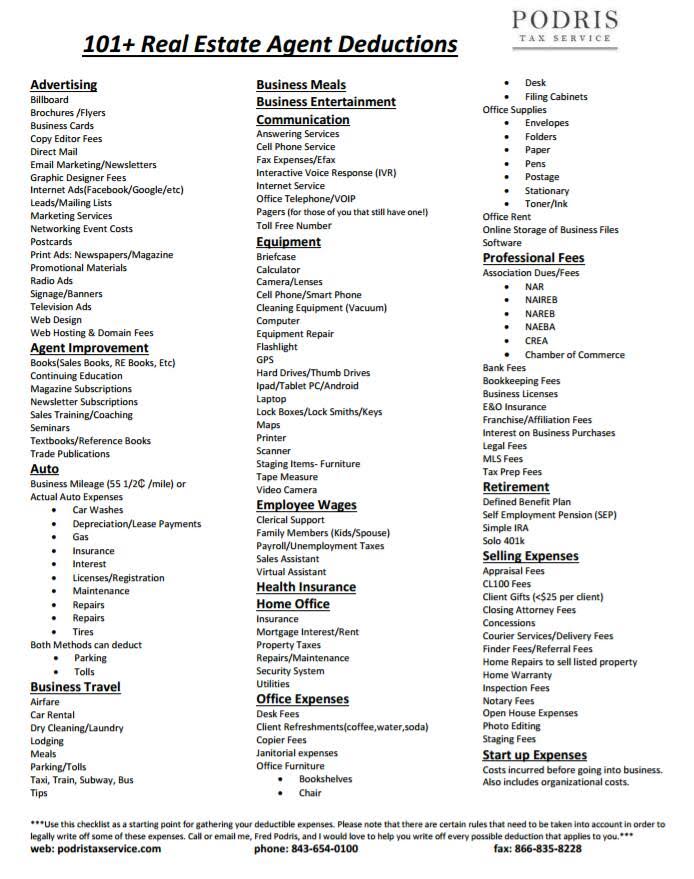10 Tax Deductions Every Realtor Should Know

As a realtor, navigating through the intricate landscape of taxes can be quite daunting. However, with a keen understanding of the tax deductions available to real estate professionals, you can significantly minimize your taxable income and hence, your tax liability. Below, we delve into 10 tax deductions every realtor should know, ensuring your journey towards tax optimization is smoother and more financially rewarding.
1. Home Office Deduction


If you use a part of your home exclusively and regularly for your real estate business, you can claim the home office deduction. This includes:
- A proportionate share of utilities like electricity, water, internet, and maintenance costs.
- Depreciation of the office space.
2. Marketing and Advertising Expenses


Realtors are constantly promoting their services to generate leads. Here are the expenses you can deduct:
- Print and digital advertising costs.
- Signage and billboards.
- Website hosting, development, and SEO services.
- Professional photography and virtual tour creation for property listings.
3. Commission Expenses

When you pay out commissions to your agents or split commissions with brokers, these amounts are deductible as business expenses.
💡 Note: Ensure you keep detailed records of all commissions paid to simplify your tax filing.
4. Travel and Transportation

Travel expenses directly related to your business are deductible. This includes:
- Mileage for driving to and from property showings, client meetings, and open houses.
- Travel costs like airfare, hotels, and meals when out of town for business purposes.
5. Insurance Premiums

You can deduct premiums for various insurance policies:
- Professional liability insurance.
- Errors and omissions insurance.
- Health insurance for self-employed individuals.
- Homeowner’s insurance if your business operations are conducted from home.
6. License and Continuing Education

To maintain your license and professional standing, you might need to invest in continuing education. These expenses can include:
- License renewal fees.
- Educational courses, seminars, and conferences.
- Books and materials related to real estate practices.
📘 Note: Ensure your educational pursuits are directly related to your real estate profession to qualify for the deduction.
7. Office Supplies and Equipment

From paper clips to computers, any item you purchase for your business can be deducted. Here are some examples:
- Computer equipment and software.
- Office furniture like desks and chairs.
- Printing, stationery, and postage.
- Client gifts up to a certain value.
8. Legal and Professional Services

Fees for legal, accounting, or consulting services are deductible. This includes:
- Legal consultations regarding business matters.
- Accountants for tax preparation and financial advice.
- Consulting services for market analysis or business strategy.
9. Retirement Contributions

If you contribute to a retirement account like a SEP-IRA or a SIMPLE IRA, you can deduct these contributions:
- Up to 25% of your net self-employment income for SEP-IRA.
- Up to $13,500 for SIMPLE IRA in 2021 (with adjustments for inflation).
10. Depreciation

Most business assets used in real estate can be depreciated over their useful life:
- Office equipment and furniture.
- Automobiles used for business purposes.
- Certain improvements to office or rental property.
These tax deductions are not only crucial for reducing your tax burden but also provide a framework for understanding how to manage your finances effectively as a real estate professional. Always keep detailed records, as the IRS might require you to substantiate your deductions. Keeping abreast with the latest tax laws and considering the expertise of a tax professional can further streamline your tax filing process, ensuring you claim all deductions you are entitled to.
In this journey of financial optimization, every dollar saved on taxes increases your capacity for reinvestment into your business, growth, or personal financial goals. It's about balancing efficiency with compliance, ensuring your real estate business thrives while remaining in the good graces of tax authorities.
What qualifies as a home office for real estate professionals?

+
A space used exclusively and regularly for real estate business activities, which can include client meetings, administrative work, or managing transactions.
Can I deduct meals while on business trips?

+
Yes, but meals are generally deductible at 50% of the cost when associated with travel or business activities away from your tax home.
How should I keep records for tax deductions?

+
Maintain detailed receipts, invoices, logs for mileage, and a schedule of business use versus personal use for assets. Keep records for at least three years after the tax filing date.
Can I deduct the full cost of equipment in the year of purchase?

+
Yes, under Section 179 of the IRS tax code, you can often deduct the entire cost of qualifying property in the year you put it into service, up to a certain limit.
What if I’m audited by the IRS?

+
Ensure you have all your documentation, receipts, and records in order. If you’ve worked with a tax professional, they can guide you through the audit process.